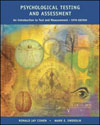Psychological Testing and Assessment: An Introduction To Tests and Measurement, 5/e
| Abuse | (1) Infliction of or allowing the infliction of physical injury or emotional impairment that is nonaccidental; (2) the creation of or allowing the creation of substantial risk of physical injury or emotional impairment that is non-accidental; (3) the committing of or allowing the committing of a sexual offense against a child; contrast with neglect, 433
|
 |
 |
 |
| ALI standard | American Law Institute standard of legal insanity, which provides that a person is not responsible for criminal conduct if, at the time of such conduct, as a result of mental disease or defect, the person lacked substantial capacity either to appreciate the criminality of the conduct or to conform the conduct to the requirements of the law; contrast with the Durham standard and the M'Naghten standard, 428
|
 |
 |
 |
| Barnum effect | The consequence of one's belief that a vague personality description truly describes oneself, when in reality that description may apply to almost anyone; sometimes referred to as the "Aunt Fanny effect," because the same personality might be applied to anyone's Aunt Fanny, 439-443
|
 |
 |
 |
| Cognitive interview | A type of hypnotic interview without the hypnotic induction; the interviewee is encouraged to use imagery and focused retrieval to recall information, 413
|
 |
 |
 |
| Competence to stand trial | Understanding the charges against one and being able to assist in one's own defense, 423, 426-427
|
 |
 |
 |
| Durham standard | A standard of legal insanity in Durham v. United States wherein the defendant was not found culpable for criminal action if his unlawful act was the prod-uct of a mental disease or defect; contrast with ALI standard and M'Naghten standard, 428
|
 |
 |
 |
| Duty to warn | A legally mandated obligation to advise an endangered third party of their peril that may override patient privilege. Therapists and assessors may have a legal duty to warn when a client expresses intent to hurt a third party in any way, ranging from physical violence to disease transmission, 69, 423
|
 |
 |
 |
| Emotional injury | A term sometimes used synonymously with mental suffering, emotional harm, and pain and suffering, to convey psychological damage, 429-430
|
 |
 |
 |
| Evolutionary view of mental disorder | The view that an attribution of mental disorder requires both a scientific judgment (from an evolutionary perspective) that there exists a failure of function, and a value judgment (from the perspective of social values) that the failure is harmful to the individual, 410
|
 |
 |
 |
| Forensic psychological assessment | The theory and application of psychological evaluation and management in a legal context, 421-430
|
 |
 |
 |
| Health psychology | A specialty area of psychology that focuses on understanding the role of psychological variables in the onset, course, treatment, and prevention of illness, disease, and disability, 435-439
|
 |
 |
 |
| Hypnotic interview | An interview conducted after a hypnotic state has been induced in the interviewee, most typically in an effort to enhance concentration, focus, imagery, and recall, 412-413
|
 |
 |
 |
| Interview | A tool of assessment in which information is gathered through direct, reciprocal communication, 8-9, 410-417
|
 |
 |
 |
| M'Naghten standard | A (since replaced) standard of insanity that hinged on whether an individual knew right from wrong at the time of commission of a crime; also known as the "right or wrong" test of insanity; contrast with the Durham standard and the ALI standard, 428
|
 |
 |
 |
| Managed care | A health care system wherein the products and services provided to patients by a participating network of health care providers are mediated by an administrative agency of the insurer that works to keep costs down by fixing schedules of reimbursement to providers, 408
|
 |
 |
 |
| Mental status examination | A specialized interview and observation used to screen for intellectual, emotional, and neurological deficits by touching on areas such as the interviewee's appearance, behavior, memory, affect, mood, judgment, personality, thought content, thought processes, and state of consciousness, 414-415
|
 |
 |
 |
| Neglect | As in child neglect, failure on the part of an adult responsible for the care of a child to exercise a minimum degree of care in providing the child with food, clothing, shelter, education, medical care, and supervision; contrast with abuse, 433.
|
 |
 |
 |
| Orientation | A three-part element of the mental status examination consisting of orientation to self (if the interviewee knows who he or she is), place (where the interview is taking place), and time (the date of the interview). Interviewees oriented to person, place, and time, are said to be "oriented 3," read "oriented times three," 414
|
 |
 |
 |
| Standard battery | Usually, the ad-ministration of a group of at least three different types of tests for the purpose of evaluating different spheres of functioning: an intelligence test, a personality test, and a neuropsychological test, 418
|
 |
 |
 |
| Stress interview | An interview purposely designed to pressure or stress the interviewee in order to gauge reaction to that stress, 412
|



 2002 McGraw-Hill Higher Education
2002 McGraw-Hill Higher Education